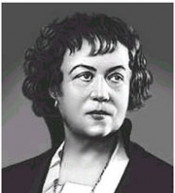
The first woman diplomat Alexandra Kollontai born
On March 19 (31), 1872 in Petersburg was born Alexandra Mikhailovna Killontai, the People’s Commissar of public charity and the first woman-ambassador in the world.
A. Kollontai (born Domontovich) was born in a wealthy noble family, received the all-round education at home, spoke fluently several foreign languages, went to the School of Arts’ support, was taking private drawing lessons. Against her parents’ will she married her distant relative Vladimir Killontai who graduated from the Military-engineer academy. However she soon left her husband and son to take part in the revolutionary movement.
In 1898 Kollontai left for Switzerland where she entered Zurich University. A year later she went to England to study the workers’ movement. On her return to Russia she participated in the first russina revolution of 1905-1907. At that period she met V. I. Lenin. After the revolution defeat Kollontai emigrated first to Europe, then to the USA, took part in the congresses of the 2nd International. During the First World War she advocated actively against the war. For this she had been persecuted in some European states.
In 1915 A. Kollontai joined the ranks of Bolsheviks whose position regarding the war she shared. After the victory of February revolution she returned to Russian and was soon assigned one of the heads of Petrograd Soviet. Kollontai assisted to the 7th (April) conference of RSDLP (the Russian Social Democratic Labor Party of Bolsheviks) in 1917as a representative of a Bolshevik military organization and among the delegates who fully supported the ‘April Theses’ of Lenin. After the October revolution of 1917 Kollontai was elected a member of the all-Russian Central Executive Committee and was given a post of the People’s Commissar of public charity in the first membership of the Soviet of People’s Commissars.
During the Civil War A. Kollontai was sent to Ukraine where she headed the People’s Commissariat for agitation and propaganda of the Crimea Soviet republic as well as the political department of the Crimea army. After the war Kollontai was the head of women department of the Central Committee of the Russian Communist Party of Bolsheviks which struggled for equalization of rights of men and women, increased the literacy among the female part of the population, information on new work conditions and family organization.
In the beginning of 1920s Kollontai asked to be assigned for diplomatic work. The authorities took into account her close connections with the European socialist movement as well as her working experience on the post of the secretary of the International women secretariat under the Communist International. From 1923 she worked as the Soviet authorized and commercial representative in Norway having made a significant contribution to political recognition of the USSR by this country. From 1927 Kollontai combined this post with fulfillment of assignments in the commercial representative office in Sweden. In 1926-1927 she worked in Mexico where she also succeeded in improvement of the Soviet-Mexican relations.
In 1930-1945 A. Kollontai worked at first as the envoy and then as the ambassador in Sweden and was also a member of the Soviet delegation in the League of Nations. The main objective for the new Soviet ambassador in Sweden was the neutralization of the Nazi Germany impact in Scandinavia. When in the course of Soviet-Finnish war Sweden, supported by the Great Britain, sent to Finland two battalions of volunteers and was on the brink of war against the USSR, Kollontai assured that Swedes moderate their position and become the go-between in the Soviet-Finnish negotiations. In 1944 being the Ambassador Extraordinary and Plenipotentiary in Sweden she once more became the go-between in the negotiations regarding Finland’s dropping out of war.
Due to a serious illness which made her wheel-chair bound A. Kollontai resigned from the ambassador’s post in 1945 but continued to serve as an advisor of the Ministry of the Foreign Affairs of the USSR.
In 1945 a group of deputes of the Norwegian storting proposed Kollontai as a candidate for receiving the Nobel Peace Prize. The deputes of the Swedish Riksdag, the women organizations of Sweden and Norway as well as eminent public figures of these countries joined the proposal but the Nobel Committee did not support the initiative.
Alexandra Kollontai died on March 9, 1952 and was buried at the Novodevichy Cemetery in Moscow.
Lit.: Аверьянова А. К. Александра Коллонтай – советский посол [Электронный ресурс] // Роль женщин в Великой Отечественной войне. Б.д. URL: http://www.a-z.ru/women_cd2/15/i8_1465.htm; Иткина А. М. Революционер, трибун, дипломат: Страницы жизни А. М. Коллонтай. М., 1970; Коллонтай А. М. Воспоминания об Ильиче. М., 1969; Коллонтай А. М. Избранные статьи и речи. М., 1972; Коллонтай А. М. Из моей жизни и работы: Воспоминания и дневники. М., 1974; Миндлин Э. Л. Не дом, но мир: Повесть об Александре Коллонтай. М., 1968; Олесин М. И. Первая в мире: Биографический очерк об А. М. Коллонтай. М., 1990; Шейнис З. С. Путь к вершине: Страницы жизни А. М. Коллонтай. М., 1987.

